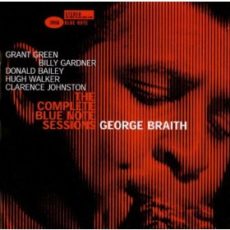
Daily Dose Of Jazz…
George Braith was born George Braithwaite on June 26, 1939 in New York City. Picking up the baritone saxophone in the seventh grade, by his teen years he had his union card. playing with the thirteen-piece Dickens LaRoca band. He would later become a leader in his own right, sharing the bill with musicians like Bud Powell, Roy Ayers and Freddie Hubbard.
His epiphany about the double-horn came in the early 1960s when one night in Harlem, while playing at the Purple Manor, Roland Kirk hit the stage blowing multiple instruments at once and blew George off the stage. They quickly became friends, though the relationship became a little more competitive when George was signed by Blue Note Records.
Known for playing multiple horns at once, a technique pioneered by Rahsaan Roland Kirk, in 1976 Braith invented the Braithophone, two different horns, straight alto and soprano mended together by extensions, valves and connections. He took his invention to Central Park and later to Broadway and 50th Street, where he perfected the sound and attracted crowds. It has become a mainstay for the soul-jazz saxophonist who continues to feature the instrument in performances at various jazz clubs in town, as well as on recordings he produces on his own label, Excellence Records.
![]()
More Posts: saxophone
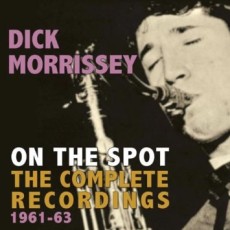
Daily Dose Of Jazz…
Richard Edwin Morrissey was born May 9, 1940 in Horley, England. Better known to the world as Dick Morrissey, he was self-taught and started playing clarinet in his school band, The Delta City Jazzmen, at the age of sixteen with fellow pupils Robin Mayhew, Eric Archer, Steve Pennells, Glyn Greenfield and young brother Chris on tea-chest bass. He then joined the Original Climax Jazz Band. This stint he followed with becoming a member of the Gus Galbraith Septet and was introduced to Charlie Parker by alto-sax player Peter King. This prompted him to begin specializing on tenor saxophone.
Making his name as a hard bop player, Dick appeared regularly at the Marquee Club in 1960 and recorded his first solo album for Fantana Records It’s Morrissey, Man! the next year at the age of 21. It featured pianist Stan Jones, drummer Colin Barnes, and The Jazz Couriers founding member bassist Malcolm Cecil.
Spending most of 1962 in Calcutta, India as part of the Ashley Kozak Quartet, he played three 2-hour sessions seven days a week. Returning to the UK Dick formed a quartet with Harry Smith, Phil Bates, Bill Eyden, Jackie Dougan or Phil Seamen. They recorded three albums between 1963 and 1966,played regular gigs at The Bull’s Head and Ronnie Scott’s, and played with Ian Hamer, South and
During this time he also played extensively in bands led by Ian Hamer and Harry South, The Six Sounds, performed briefly with Ted Heath’s Big Band, John Dankworth and his Orchestra, was a part of Eric Burdon and The Animals Big Band with Stan Robinson, Al Gay, Paul Carroll, Ian Carr, Kenny Wheeler and Greg Brown.
He would go on to tour and/or record with visiting musicians Brother Jack McDuff, Jimmy Witherspoon, J. J. Jackson, Sonny Stitt and Ernest Ranglin. He would win many Melody Maker Jazz Polls, toured and recorded with Average White Band, team up with guitarist Jim Mullen of Brian Auger’s Oblivion Express and released seven albums of their 16-year association.
Throughout his career as a leader of his own combos, Morrissey he was an in-demand musician playing with Tubby hayes, Bill LeSage, Roy Budd, Charlie Watts, Georgie Fame, Anie Ross, Dusty Springfield, Paul McCartney, Freddie Mack, Orange Juice, Herbie Mann, Shakatak, Peter Gabriel, David Fathead Newman, Boz Scaggs, Johnny Griffin, David Sanborn, Steve Gadd, Richard Tee, Billy Cobham, The Brecker Brothers, Sonny Fortune, Teddy Edwards and the list of players goes on and on. He is known for playing the haunting saxophone solo on the Vangelis composition Love Theme for the 1982 film Blade Runner.
Tenor saxophonist Dick Morrissey, who also played soprano saxophone and flute, passed away on November 8, 2000, aged 60, in Kent, England after many years battling various forms of cancer.
![]()
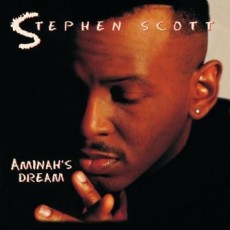
Daily Dose Of Jazz…
Stephen Scott was born March 13, 1969 in Queens, New York. He started piano at the age of five, and progressed rapidly to the point where he was taking private lessons at Juilliard at 12. Grounded in classical music, he was also exposed to reggae and salsa on the radio. It was in high school that he was introduced to jazz, giving Justin Robinson credit.
By the age of 18, Scott was playing in the Betty Carter band and soon began performing or recording with the likes of the Harper Brothers, Wynton Marsalis, Bobby Watson and Bobby Hutcherson.
Beginning in 1991, as a leader and solo artist, Stephen recorded a stream of mainstream albums for Verve and Enja record labels, using mixtures of fellow young lions Roy Hargrove, Craig Handy, Peter Washington, Christian McBride, Jeff “Tain” Watts, Lewis Nash and esteemed veterans like Joe Henderson, Ron Carter and Elvin Jones as sidemen. Henderson returned the invite on his commercial breakthrough Lush Life, the same year and also recorded with Freddie Hubbard and Sonny Rollins.
Jazz pianist Stephen Scott continues to perform, tour and record fusing his neo-bop music base with soul jazz tendencies with Latin rhythms.
More Posts: piano
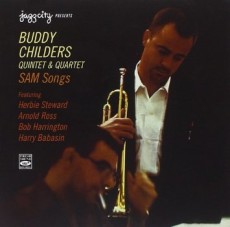
Daily Dose Of Jazz…
Buddy Childers was born Marion Childers in Belleville, Illinois on February 12, 1926. He came to fame in 1942 at the age of 16 when he took over the first trumpet chair in the Stan Kenton Orchestra. For years he worked with Kenton as well as performing with Tommy Dorsey, Woody Herman, Les Brown, Charlie Barnet, Dan Terry and other big bands.
He would go on to work with Gene Ammons, Elmer Bernstein, Maynard Ferguson, Clare Fischer, Milt Jackson, Carmen McRae, Oliver Nelson and Lalo Schifrin among others. No stranger to television programs and or films, Childers put together a big band that recorded for Candid Records in the 1980s and 1990s. He also recorded quintet and quartet sessions with Herbie Steward, Arnold Ross, Bob Harrington and Harry Babasin on the Jazz City label.
Trumpeter, composer and ensemble leader Buddy Childers passed away of cancer on May 24, 2007, at the age of 81.
More Posts: trumpet
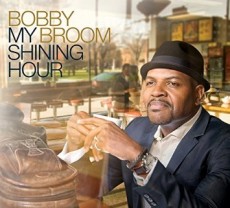
Daily Dose Of Jazz…
Bobby Broom was born Robert Broom Jr. on January 18, 1961 in New York City and began studying the guitar at age 12, taking lessons in the American Folk music style. A year later, he studied with jazz guitarist Jimmy Carter in Harlem where he took weekly lessons for the next two years.
His interest in jazz began in earnest at age 15 and as a result he began his research, study and practice of the jazz art. Broom attended the Laguardia High School of Performing Arts where he played in the jazz ensemble. He received an award for Outstanding Jazz Improvisation during his senior year.
Broom began his career while still in high school, performing at New York clubs with Charlie Parker’s pianists, Al Haig and Walter Bishop Jr. By 1977 he was playing with Sonny Rollins and Donald Byrd at Carnegie Hall. He went to Berklee School of Music in 1978, then returned to New York the next year in order to pursue his career while attending Long Island University.
At this time he began working in New York as guitarist for Art Blakey and The Jazz Messengers, Dave Grusin, Hugh Masekela and Tom Browne and landed his own recording contract with GRP Records. He earned three DownBeat Critics Poll nods from 2012 to 2014 as one of the world’s foremost jazz guitarists.
He has performed with Max Roach, Stanley Turrentine, Kenny Garrett, Miles Davis, Dr. Lonnie Smith, Charles Earland, Dr. ohn, Ron Carter, Dianne Reeves, Eon Blake, Eric Alexander, Ron Carter and Ramsey Lewis among others. He has recorded as a leader with The Deep Blue Organ Trio, The Bobby Broom Organi-Sation and his trio with Kobie Watkins and Makaya McCraven..
In the mid 1980s Broom relocated and as an educator, Broom began his work in 1982 for Jackie McLean, Director of African American Music at Studies for the Hartt School of Music at the University of Hartford. Over the years he has also been a lecturer/instructor at the American Conservatory of Music, Chicago Musical Colege-Roosevelt University, DePaul University and North Park University. He currently instructs and coaches Chicago area high school students for the Ravinia Festival Organization’s community outreach — Jazz Scholar Program, as well as the Thelonious Monk Institute.
More Posts: guitar


